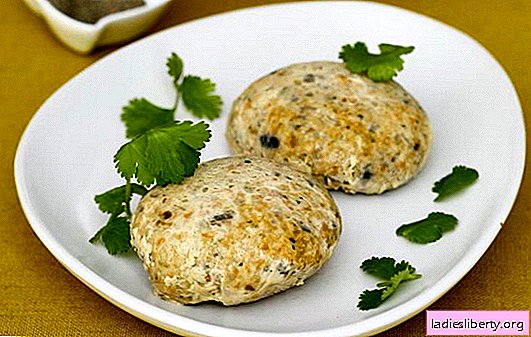
"Little blue ones," as the eggplant is affectionately called by the people, is not a vegetable, but a berry from the nightshade family.
Tasty pulp can be used to prepare various second courses, appetizers, salads, winter preparations.
Eggplant dishes are not only tasty, but also very healthy.
The chemical composition of eggplant
Eggplant has a difficult character, with bitterness. It is caused by solanine - a natural poison that is found in the peel of purple fruits.
By the way, the color of the peel can be different: blue, deep purple (almost black) and even white. Regardless of color, the fruit is a storehouse of vitamins and minerals, which have a strong effect on human health.
Scientists have discovered under the bitter skin of a fruit natural substances that explain the benefits and harms of eggplant:
• B vitamins (folic acid, thiamine, niacin, riboflavin, pyridoxine) improve metabolic processes, normalize the functioning of the nervous system, and stimulate blood formation;
• ascorbic acid strengthens the immune defense;
• nicotinic acid (vitamin PP) makes the walls of blood vessels stronger;
• retinol (vitamin A) is good for vision;
• tocopherol (vitamin E) - a powerful antioxidant that fights cancer cells and rejuvenates;
• Vitamin K helps cells synthesize protein;
• macroelements (potassium, magnesium, sodium, chlorine, phosphorus, calcium, zinc, manganese) are vital for the normal functioning of all systems and organs of the human body;
• microelements (fluorine, copper, iron, iodine, etc.) ensure the normal course of cell metabolism, improve the condition of the skin, nails, hair;
• pectin and fiber stimulate the digestive tract, remove toxins from the intestines, and reduce bad cholesterol.
Eggplant is considered the champion in the content of such trace elements as molybdenum. It is this substance that prevents inflammatory diseases of the joints. The richness of the chemical composition and explains the huge health benefits of eggplant. It is no accident that eggplant in the East has long been considered the fruit of longevity.
As for solanine, it is important for creating a complete picture of the benefits and harms of eggplant. But by and large, the content of this poison in the skin is negligible (much more than it is in green potatoes).
Useful properties of eggplant
By eating eggplants regularly, we can protect our body from many unpleasant and life-threatening diseases.
Useful properties of eggplant are manifested in the ability to have a beneficial effect on human health:
• reduce the risk of developing heart disease by strengthening the myocardium;
• increase the elasticity of the walls of blood vessels;
• normalize the water balance, removing puffiness and normalizing the work of the kidneys;
• lower cholesterol, preventing diseases of the liver and blood vessels;
• cleanse not only the intestines, but also the bile ducts;
• prevent the development of urolithiasis and cholelithiasis;
• strengthen bone tissue;
• reduce weight;
• relieve constipation;
• inhibit the formation of cancer cells.
Eggplant pulp has diuretic, decongestant, laxative, bactericidal properties. Doctors recommend including hypertensive patients in their diet, as well as patients suffering from atherosclerosis and arrhythmias, osteoporosis and osteochondrosis.
Incorporate delicious light eggplant dishes into your diet for those who quit smoking. The fact is that the fruits contain not only solanine, but also another poison - nicotine. To harm the body, it is not enough. But to facilitate the process of weaning from cigarettes - it is enough.
Useful properties of eggplant can be used by pregnant women. Manganese and copper contained in the purple berry improve blood formation processes, and this is very important for both the expectant mother and the fetus. Another valuable substance - folic acid - ensures the normal formation of the placenta, the development of pathologies in the body of the unborn baby is prevented.
The health benefits of eggplant also lie in the fact that one of the flavonoids that the fetus is rich in, namely nasunin, helps brain cells defend themselves against the damaging effects of free radicals. Eggplant not only prolongs life, but also retains clarity of reason for a long time.
One of the most amazing properties of the “blue ones” is cancer prevention. This is actually true, since their pulp contains the so-called oncoprotective substances (more than 13 phenolic acids). Black eggplants are especially useful, the most phenolic compounds in them.
Fruits can be eaten not only in food. The use of eggplant for the body is also manifested with external use. In folk medicine, fresh juice of nightshade is actively used. It has been successfully used to treat gout, arthritis, and inflammation of the skin. Eggplant juice is an excellent natural antibiotic and antiseptic that can kill pathogenic microorganisms, bacteria, and fungi.
Can there be harm from eggplant
The benefits and harms of eggplant cannot be measured to the same extent. The benefits are undoubtedly greater. As for the harm, the same solanine, which has already been mentioned, can cause it. In high concentration, this substance is dangerous for the human body.
The "older" the eggplant, the more it accumulates solanine. That is why it is recommended to eat young eggplants for food. Ripe specimens are not suitable for food at all. In any case, a purple skin is necessarily cut off from them, in which highly toxic solanine is concentrated.
What is the danger of this poison? Severe poisoning with them leads to dizziness, indigestion, colic and cramps. Getting rid of the bitterness of eggplant, we also get rid of solanine.
In addition to this alkaloid, eggplant pulp contains substances that cause an increased concentration of oxalic acid. In turn, it is oxalic acid salts that lead to the formation of kidney stones. So with a tendency to urolithiasis, eggplant should be used carefully.
Eggplant, like any product, can cause allergies. You need to carefully monitor the reaction of the body if the product is used for the first time. This is especially important when it comes to the health of a small child.
Who should not eat eggplant
It is not recommended to acquaint the child's body with eggplant until the child reaches the age of three years. By this time, the immune system is fully formed and the intestines are ripening. Coarse fiber and toxic solanine can be processed by the child's body. At an earlier age, eating eggplant can result in an allergic reaction and poisoning.
Do not eat eggplant dishes for people suffering from a number of chronic diseases:
• acute and chronic diseases of the gastrointestinal tract (gastritis, ulcer);
• acute inflammation of the pancreas;
• intestinal disorders of various nature;
• aggravation of gout;
• insulin therapy;
• Iron-deficiency anemia;
• allergy;
• chronic kidney disease associated with the risk of stone formation.
Eggplant has a lot of fiber, which makes the stomach and intestines work hard. In the presence of inflammatory phenomena on the mucous membrane of these organs, the consequences can be serious.
Due to its beneficial properties, eggplant has gained fame as one of the most important plant foods for human health. In the process of cooking, it is customary to combine it with equally useful garlic.











